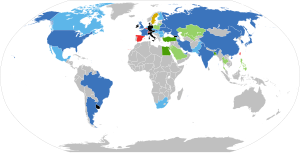 Image via Wikipedia
Image via Wikipedia
They are known as the ‘Fukushima 50’ by the media but the workers who have been battling tireless to bring the reactors under control at Japan’s nuclear plant have now admitted that they expect to die from radiation sickness.
The news was revealed by the mother of one of the men involved and has spoken of how the workers have discussed their situation and have now come to terms with the fact that death is a strong possibility.
She said: “My son and his colleagues have discussed it at length and they have committed themselves to die if necessary in the long-term.”
The ‘Fukushima 50’ consists of a group of around 300 technicians, soldiers and firemen who got their name from working in shifts of 50. In the past weeks following the devastating earthquake and the resulting tsunami, the men have been exposed repeatedly to dangerously high radioactive levels as they heroically try to avert a nuclear disaster.
The troubles in Japan have sparked the French president, Nicolas Sarkozy to call for international safety standards on nuclear power by the end of the year. Meanwhile in Japan fears surrounding the extent of radiation leaks continue to grow.
Mr Sarkozy made the first trip by a foreign leader to Japan since the catastrophic earthquake and tsunami that hit the country on March 11. Since the visit the French president has called for a meeting of the G20’s nuclear power watchdogs to discuss safety regulations.
President Sarkozy’s proposed action comes just days after the deputy Prime Minister, Nick Clegg, spoke of the potentially high costs required to standardise the safety of nuclear energy. His words cast doubt over whether funds would be put forward to deal with this issue in the future.
Mr Clegg insisted that no more public funds would be made available, he said: “We cannot let the taxpayer be ripped off, which is what they always have been in the past.”
Meanwhile over in Japan, the struggle continues to regain control over crucial cooling systems at the four damaged reactors at the Fukushima nuclear plant.
Things only seem to be getting worse as word spread of potential leaks from the plant in north-eastern Japan after radioactive iodine was found in nearby seawater. The seawater tested at 4,385 times the legal limit.
However, Japan has asked trading partners at the World Trade Organisation not to “overact” by unnecessarily restricting the import of food produce.
The devastating earthquake, which left 27,000 killed or missing, a quarter of a million homeless happened nearly three weeks ago and it is all too clear that Japan will be struggling to get over it for many years to come.
The event has even been forecast as the world’s costliest natural disaster. The government has estimated it will take over £75 billion to get Japan back on its feet in the biggest reconstruction project since the end of the second world war.
References:
Story of the Fukushima 50
Health implications






0 comments:
Post a Comment